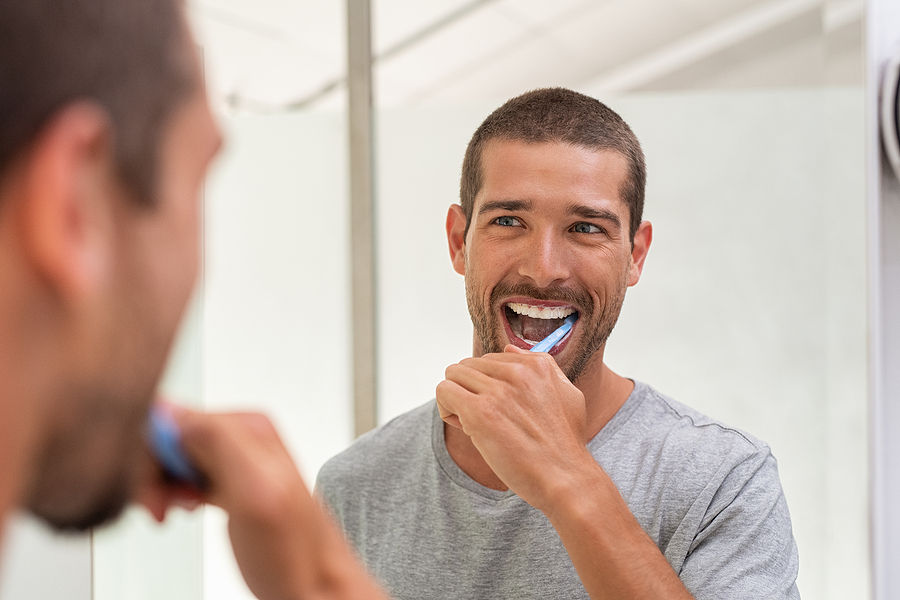Dental abscesses can be very distressing, causing intense toothache and gum pain, redness in the mouth and on the face and jaw, sensitivity to hot and cold food and drink, swelling, a high temperature and difficulty opening your mouth.
These sores typically manifest due to a build-up of pus beneath the gums or teeth when there’s an infection in the mouth. Causes include:
– An impacted tooth, where it hasn’t grown out of the gums properly
– Gum disease
– Tooth decay
– An injury to the teeth, gums or mouth
– Radiotherapy/chemotherapy
How can dental abscesses be prevented?
The good news is that there’s a lot you can do to prevent dental abscesses from appearing, such as by brushing your teeth with fluoride toothpaste at least twice a day.
Fluoride can help strengthen tooth enamel, which makes it more resistant to decay. This, in turn, makes cavities less likely, reducing the risks of abscesses. Fluoride also has anti-inflammatory properties, which can afford you further protection against abscess onset.
Practise good oral hygiene
One of the best ways to prevent dental abscesses is to follow an excellent oral hygiene routine.
As mentioned, using a fluoride toothpaste can help protect against cavities and decay, but you should also aim to floss at least once a day, either using thread floss or interdental brushes and toothpicks to keep your gums in good condition.
When brushing your teeth, look out for any blood in the sink when you spit as this is a sign that you have inflammation in the gum area. Flossing regularly will help prevent this, making abscesses far less likely over time.
Flossing isn’t just about getting rid of food that’s stuck between your teeth. It also helps remove plaque that forms along the gumline.
Use a length of floss or dental tape between 30cm and 45cm long, holding it taught between your fingers. Slip it through the teeth and into the area between the teeth and gums. Go up and down each tooth gently, using eight to ten strokes per tooth for a solid clean.
If you’re using interdental brushes, make sure that the brush itself fits snugly between the teeth. You can use it in a back and forth motion or turn it slowly in a circle, working your way around the mouth. It can be difficult to access the back teeth but turning your head at an acute angle can help you target your molars effectively.
Also make sure that you don’t rinse your mouth out when you’ve finished brushing your teeth. Rinsing immediately afterwards will wash out the fluoride so you’ll be less protected against decay.
Regular dentist check-ups
It’s certainly not uncommon for people to be afraid of going to the dentist. In fact, studies show that 53 per cent of people in the UK are scared of seeing the dentist, while 17 per cent are so afraid that they actually refuse to go or have essential dentistry work carried out.
Wherever possible, it is advisable to see a dentist every six months for a check-up and scale and polish, so that any potential issues can be caught and dealt with early on. This preventative way of working will keep dental pain to a minimum and also potentially save you on associated treatment costs.
However, it can be difficult to get an appointment with an NHS dentist these days, mainly because there just aren’t enough practitioners to go around. Everyone needs dental care and, as such, there are often insufficient dentists to meet demand – so you either have to wait a long time to get an appointment or ultimately not be able to find one at all.
In rural regions, for example, there may not be enough dental practices for all those in the area, so you may have to travel far to be seen. NHS budget constraints also make it harder for people to access the care they need.
If you can’t get a dentist appointment or register with a practice, get in touch with your local integrated care board to see how they can help.
Improve your diet
What you eat can affect the health of your mouth so if you’ve been experiencing inflammation of any kind and are worried, you could try making a few dietary changes to see if that helps address your symptoms.
Sugary and starchy food can feed oral bacteria, which can increase the risks of tooth decay and abscesses. Instead, go for healthier options like fruit and vegetables, as well as drinking lots of water and staying hydrated to flush out any lingering bacteria in your mouth.
Cut down on smoking & alcohol
You are more likely to get tooth abscesses if you smoke compared to people who don’t, so if you’re concerned about your oral health, perhaps consider cutting down on how much you’re smoking, or quitting altogether.
Similarly, drinking alcohol can weaken your immune system and make it harder for your body to fight off infections like periodontitis (also known as gum disease). This will likely increase the risks of dental abscess onset, so again if you’re worried, perhaps now’s the time to cut down on alcohol consumption.
How can dental abscesses be treated?
Even if you do everything right and follow best practice advice, you may still find that a dental abscess manifests at some point.
You can relieve the pain you’re in by taking painkillers like ibuprofen and paracetamol, but remember that these medications won’t address the root cause of the problem. Buying amoxicillin for tooth infections is advisable, particularly if you can’t get a dentist appointment, as this will help you tackle the problem at its source.
Note, however, that you should not leave your dental abscess untreated over the long term, as your symptoms will likely only get worse. Dental abscesses can only be properly treated by a dentist, who will typically make a small incision at the site and drain the pus out.






